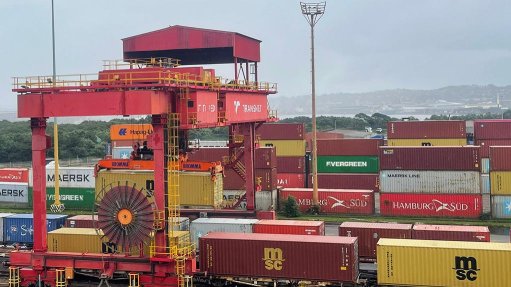Poverty, rising prices bigger concerns than climate change for South Africans
The main concern South Africans face is poverty, highlighted by 68.4% of respondents to office and printing systems multinational Epson Climate Barometer survey, while rising goods and services prices are the second greatest concern, as noted by 64.2% of respondents.
The third most pressing concern facing South Africans is climate change, with 58% of respondents citing climate concerns as one of the biggest issues facing the world today.
“With challenges such as power cuts and record unemployment levels in the country stunting economic growth, it is no surprise that South Africans’ main concerns centre on issues like poverty and inflation for a second year in a row,” says Epson South Africa country manager Timothy Thomas.
“The fact that climate change remains a major concern in our market is also telling of a growing environmental awareness among South Africans,” he adds.
Meanwhile, the barometer revealed interesting discrepancies between people aged 29 and under, and older generations.
Those aged 29 and below were less likely to cite climate change as one of the biggest issues facing the world today, at only 55.6% of these respondents, than those aged 30 and over, at 58.9%. Respondents aged 55 years and older age group were the most likely, at 74.2%, to cite climate change as one of the main concerns.
The 29 and under respondents were also notably more optimistic, with 71.7% believing that the world can avert a climate crisis in their lifetimes, compared to 59.6% of those aged 30 and over.
Further, when compared to the survey's 2022 statistics, the overall proportion of South Africans who share this optimism that a climate crisis can be averted in their lifetimes has increased from 56.6% to 62.5% in this year's barometer.
“There is a promising trend of increased awareness and action among both individuals and businesses in South Africa when it comes to addressing the looming climate emergency. Many South Africans are recognising their role and responsibility in making a positive impact, not only in their personal lives but also within their social and professional circles,” he comments.
“It is heartening to see South Africans adopting more environmentally conscious practices and advocating for change, including making sustainable shopping choices and becoming champions for change among their peers to make a meaningful difference,” says Thomas.
The three editions of the Climate Barometer survey highlight that there has been notable progress. In 2021, 63.3% of respondents took steps to reduce their plastic use, 62% were improving their recycling habits, and 60.3% were opting for walking and cycling over driving.
In 2023, 85.1% of South Africans have committed to using recyclable goods, 71.3% are actively working to reduce plastic use, and 65% are choosing sustainable transportation options like walking or cycling.
However, the responsibility does not rest solely on individuals, and South African businesses are also expected to play their part in reducing their carbon footprint and actively contributing to the fight against climate change, he adds.
The barometer results reveal that 60% of South African respondents anticipate local businesses and companies will invest more in environmental technologies, and nearly 55% believe that companies should prioritise efforts to improve recycling and the reuse of products.
“South African businesses have a crucial role to play in mitigating the impact of climate change. We must make a greater effort to reduce the environmental impact of our manufacturing and internal processes while also setting an example by adopting eco-friendly practices.
“As South African businesses step up to the plate, they have an opportunity to lead by example. By investing in eco-friendly technologies and embracing sustainable practices, they will not only reduce their carbon footprint but also inspire others to follow suit. This proactive approach aligns with the global call for greater corporate responsibility in the face of climate change,” Thomas emphasises.
Article Enquiry
Email Article
Save Article
Feedback
To advertise email advertising@creamermedia.co.za or click here
Press Office
Announcements
What's On
Subscribe to improve your user experience...
Option 1 (equivalent of R125 a month):
Receive a weekly copy of Creamer Media's Engineering News & Mining Weekly magazine
(print copy for those in South Africa and e-magazine for those outside of South Africa)
Receive daily email newsletters
Access to full search results
Access archive of magazine back copies
Access to Projects in Progress
Access to ONE Research Report of your choice in PDF format
Option 2 (equivalent of R375 a month):
All benefits from Option 1
PLUS
Access to Creamer Media's Research Channel Africa for ALL Research Reports, in PDF format, on various industrial and mining sectors
including Electricity; Water; Energy Transition; Hydrogen; Roads, Rail and Ports; Coal; Gold; Platinum; Battery Metals; etc.
Already a subscriber?
Forgotten your password?
Receive weekly copy of Creamer Media's Engineering News & Mining Weekly magazine (print copy for those in South Africa and e-magazine for those outside of South Africa)
➕
Recieve daily email newsletters
➕
Access to full search results
➕
Access archive of magazine back copies
➕
Access to Projects in Progress
➕
Access to ONE Research Report of your choice in PDF format
RESEARCH CHANNEL AFRICA
R4500 (equivalent of R375 a month)
SUBSCRIBEAll benefits from Option 1
➕
Access to Creamer Media's Research Channel Africa for ALL Research Reports on various industrial and mining sectors, in PDF format, including on:
Electricity
➕
Water
➕
Energy Transition
➕
Hydrogen
➕
Roads, Rail and Ports
➕
Coal
➕
Gold
➕
Platinum
➕
Battery Metals
➕
etc.
Receive all benefits from Option 1 or Option 2 delivered to numerous people at your company
➕
Multiple User names and Passwords for simultaneous log-ins
➕
Intranet integration access to all in your organisation

















